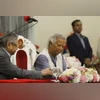Stop attacks against minorities or I'll resign: Bangladesh's Muhammad Yunus
The newly sworn-in chief adviser Muhammad Yunus cautioned the student leaders flanking him and the nation that if the violence against minorities doesn't stop, he will resign
)
Nobel laureate Muhammad Yunus signs a document after taking the oath of office as the head of Bangladesh's interim government, in Dhaka, Bangladesh, Thursday, Aug. 8, 2024. (Photo: PTI)
Bangladesh’s newly sworn-in Chief Adviser Muhammad Yunus has called for an end to all forms of violence following a massive uprising after former Prime Minister Sheikh Hasina resigned and fled the country, which has included communal attacks on minorities.
In a video that went viral on social media, Yunus can be heard cautioning the student leaders flanking him that if the violence against minorities doesn’t stop, he will resign.
"If you trust me to lead your country, the first step is to cease all attacks on people, especially minorities. Without this, my efforts are futile, and it would be better if I stepped aside," said Yunus, now the Chief Adviser of Bangladesh's new interim government.
Earlier in a statement, Yunus, who accepted the role of leading an interim government at the request of student leaders, the military, and the president, praised the "brave students who took the lead" in the protests. He likened Prime Minister Sheikh Hasina's resignation on Monday to "our second Victory Day," comparing it to Bangladesh's independence in 1971.
Yunus cautioned against squandering this opportunity, urging everyone to "stay calm" and avoid violence. He appealed to students, political parties, and the general public to maintain peace, emphasising the potential for growth and prosperity in the country. "Violence is our enemy. Let's not create more. Be calm and prepare to build our nation," he added.
Also Read
Meanwhile, on Thursday, Prime Minister Narendra Modi extended his best wishes to Yunus as he assumed leadership of the interim government. Modi expressed hope for a swift return to normalcy and the protection of minority communities in Bangladesh.
Posting on X (formerly Twitter), Modi said, "My best wishes to Professor Muhammad Yunus on the assumption of his new responsibilities. We hope for an early return to normalcy, ensuring the safety and protection of Hindus and all other minority communities. India remains committed to working with Bangladesh to fulfil the shared aspirations of both our peoples for peace, security, and development."
The swearing-in of Muhammad Yunus
Yunus, 84, was sworn in as the head of the interim government by President Mohammed Shahabuddin at a ceremony at the Bangabhaban presidential palace. Now serving as Chief Adviser—a position equivalent to prime minister—Yunus leads a 16-member interim Cabinet, primarily composed of civil society members, including two student protest leaders. The Cabinet was formed through discussions between student leaders, civil society, and the military.
In his first national address, Yunus warned that those instigating chaos would face strict legal consequences. "The conspirators have created an atmosphere of anarchy and fear in the country to thwart our second independence through the uprising of the student masses. Anarchy is our enemy, and it must be defeated quickly," he asserted.
Sheikh Hasina’s resignation and the ensuing violence
Bangladesh descended into chaos on Monday, August 5, following Prime Minister Sheikh Hasina's resignation and subsequent flight to India. The military then assumed control, establishing an interim government led by Muhammad Yunus to address the power vacuum.
Hasina's departure ignited a fresh wave of violence across Dhaka and other regions, exacerbating the already fragile situation. Mobs took to the streets, vandalising government property and even ransacking Hasina's official residence.
The violence escalated the following day, spreading nationwide, with numerous reports of attacks on pro-Awami League supporters and minority communities. Several local and international media outlets have reported on these developments.
The wave of communal violence also targeted significant sites, including the Indira Gandhi Cultural Centre (IGCC) in Dhaka and the Bangabandhu Memorial Museum (Bangabandhu Bhaban).
While the exact extent of the attacks is still unclear, the violent unrest claimed the lives of two Hindu councillors. Reports indicated that several homes belonging to the Hindu community were attacked, forcing many to flee and seek refuge. The Daily Star reported that Haradhan Roy, a member of the Parshuram Thana Awami League and a councillor in Rangpur City Corporation, was fatally shot during the clashes. Another Hindu councillor from Rangpur, Kajal Roy, was also killed during the protests, as reported by The New Indian Express.
An ISKCON temple in Meherpur, Khulna division, was also vandalised and set ablaze on Monday, according to a PTI report.
Despite the violence, reports have also emerged of various student organisations and common Bangladeshis forming groups to protect minorities and maintain vigilance over religious sites belonging to minority communities.
More From This Section
Don't miss the most important news and views of the day. Get them on our Telegram channel
First Published: Aug 09 2024 | 11:39 AM IST